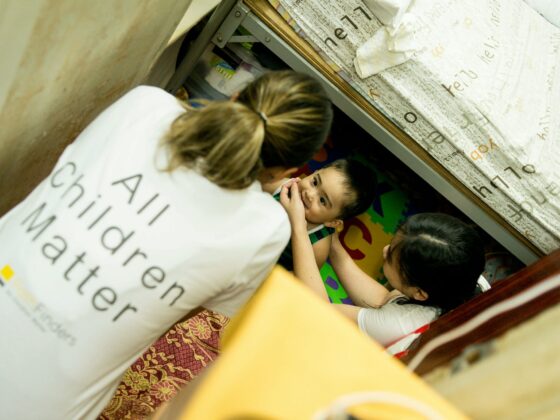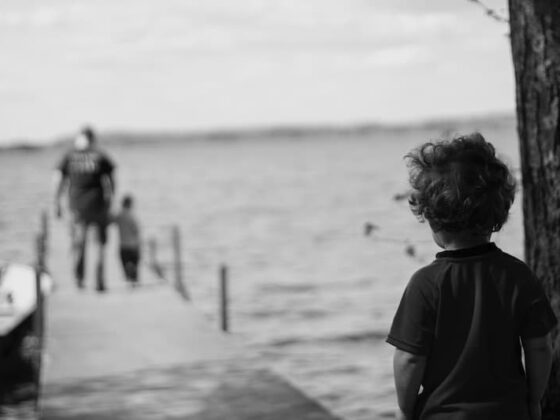Making the invisible truly visible: Friday 18 November 2022 marks the celebration of LGBT+ inclusion. Pink Friday is a collective community effort where organisations across different industries encourage their employees to wear pink shirts. These organisations host various events to help raise awareness of LGBTQ+ issues. Once again Hugill & Ip, alongside more than 100 businesses in Hong Kong and the region, join to show support for diversity and LGBT+ inclusion.
This year Pink Friday takes a deeper meaning for us as it falls during The Shield of Justice – a fundraiser and legal awareness campaign in support of The Hong Kong Committee on Children’s Rights (HKCCR).
We wish to enhance the need for Hong Kong LGBT+ community and its allies to continue the fight for equality of sexual minorities, which undoubtedly include guaranteeing children of same-sex couples to have their human and civil rights fully recognised.
Joint custody and Care & Control
Same-sex couples do not currently enjoy the same parental rights as heterosexual couples in Hong Kong. Therefore, same-sex parents are not attributed equal parental rights.
In May 2021 a step forward has been made though the Court of First Instance ruling of AA v BB [2021] HKCFI 1401.
The Applicant and Respondent were same-sex partners who had two children (X and Y) through donor insemination, with the Applicant being the sole gestational parent. The parties broke up, and expressed their wish to be co-parents of the children. The Applicant seeks for the Respondent to be made a guardian of the children and that the parties have joint custody and joint care and control of the children. X was born in Australia with both parties recognised as his legal parents in that jurisdiction. Y was born in Hong Kong, hence he could only have the biological mother (the Applicant) registered as his legal parent. Under the laws of Hong Kong, only the Applicant could be recognised as the legal parent of X and Y, while on the other hand the Respondent had no custodial or guardianship right toward either child.
Ultimately, the Court of First Instance ruled that the Respondent, a non-biological parent of a child born by her former same-sex spouse should be granted guardianship rights, joint custody and shared care over her children.
This case marks an important move to equality in granting custodial and parental rights to non-gestational parents by honouring the minors’ welfare and best interest.
One point to note is that the Order in AA v BB was made on the premises that there is no dispute between the parties (i.e. the two parents) for the Order sought. The parties were reported to be able to share their parental responsibilities amicably. In an acrimonious split when children and finance issues in dispute, the making of such Order may not be as smooth. It is often times consuming and costly to make an application to Court, and nevertheless the right of same-sex married couple to their children is not properly recognised under the current legislation in Hong Kong. Therefore, AA v BB should not be regarded as the Court’s absolute recognition of parental rights of same-sex couples to their children, in fact the Court would look at each case with its own facts and has absolute discretion to make an Order with the child’s best interest in mind.
Adoption
According to section 4 of the Adoption Ordinance (Cap. 290) (“AO”), the Court might grant adoption order upon application by a sole applicant, or joint application by 2 spouses. Since equal marriage is not recognised in Hong Kong, same-sex couples are not recognized as spouses and therefore cannot adopt together. Either one of them would have to apply as sole applicant.
In accordance with the AO, a single person can apply for adoption in Hong Kong as long as the applicant fulfils the adoption requirements. However, the Court will not make an adoption order in respect of a female infant in favour of a sole male applicant, unless the Court is satisfied that there are special circumstances which justify as an exceptional measure the making of an adoption order. The intent of this provision is to safeguard against potential risk of sexual abuse by a sole male applicant. Although it is a well intent, it is inherently discriminatory and out-dated. The fact that same-sex couples are forced to apply as sole applicant simply makes things worse.
Step-parent adoption becomes an even trickier subject when dealing with same-sex couples because of the lack of recognition of equal marriage. The word discrimination might pop out again in most of our minds!
We have previously talked about single parent and step-parent adoption in our article “101 on Adoption in Hong Kong”, highlighting the process and its hurdles.
IVF and surrogacy
In-vitro fertilisation – commonly called IVF – and artificial insemination are the two methods commonly pursued by lesbian couples wishing to start a family. In Hong Kong IVF services are provided by several public hospitals only to permanent resident women who are under 40 years old and do not have any biological children, making the process only available to women married to a man, as stated in the Human Reproductive Technology Ordinance (Cap 561).
Commercial surrogacy is supposed to be a criminal offence – no matter which country or territory in the world it occurs – and surrogacy arrangements cannot be enforced as provided in the same ordinance. Unmarried individuals who go to other jurisdictions to undergo commercial treatments such as IVF or surrogacy can face fines of up to HK$25,000 and six months imprisonment, rising to HK$50,000 and two years in jail for a second offence.
An additional complication is effectively created by the Parent and Child Ordinance (Cap 429), which states that the surrogate mother is to be regarded as the child’s mother and that the surrogate mother’s husband is to be regarded as the child’s father, moreover establishing that such provisions have worldwide effect, no matter where the surrogacy has taken place. This means that the child’s legal status in most circumstances does not match birth certificates issued in other jurisdictions. The ordinance also provides that Hong Kong Courts can give legal parenthood in favour of gamete donors, even if some exceptions exist:
- The order can only be made in favour of parties to a marriage, referred as the husband and the wife;
- The application has to be made within 6 months of the birth of the child;
- Both commissioning parents must agree unconditionally to the order; and
- In case of commercial surrogacy, the Court needs to approve the arrangement. However, note that the approval itself does not necessarily exclude the criminal liability of a commercial surrogacy.
The latter is a tricky area – the latest case law basically approved the commercial surrogacy arrangement because prosecution was time barred and there would be no harm done in granting a parental order (see FH v WB HCMP 1313/2018). The court acknowledged that there was a potential conflict between the Court’s jurisdiction to approve and the criminal liability. This still remains unresolved now.
This means that such arrangements can cause many legal and emotional complications for commissioning parents. More often than not, parents rely on jurisdictions which are able to issue birth certificates in the commissioning parents’ names and then apply for the child’s residence in Hong Kong through a dependant visa.
Estate Planning
Despite the lack of equal marriage rights in Hong Kong, same-sex couples can enjoy some of the same benefits granted to heterosexual couples, and similarly children of a same-sex marriage can have some sort of protection. However, such rights are currently subject to the result of the appeal of Ng Hon Lam Edgar v Secretary of Justice [2020] HKCFI 2412, in other words such rights would no longer be recognised if the Government’s appeal is successful at the Court of Appeal.
Certainly, the first step for rainbow families is to make a Will. If they have not made a formal Will, under Hong Kong law assets shall be distributed in accordance with the Intestate Estate Ordinance (Cap 73), which is unlikely to be in accordance with the couple’s wishes and the right level of protection for their children.
Another important step is putting in place a Deed of Appointment of Guardianship. Signing over permanent and temporary custody is not very hard to do, and it can protect children in situations when one or both parents are unavailable to provide for their care. While it is never an easy matter to face, it is important to know how to sign over custody in the event that it becomes necessary. The overall process is not a complicated one, and it becomes even more crucial when dealing with situations which include same-sex parents. A person appointed as the guardian of a minor has parental rights and authority in respect to the minor once guardianship assumes.
Additional Estate Planning tools that couples ought to consider in order to protect their spouse and children are Enduring Powers of Attorney, Advance Health Directives and other post-death arrangements which help to protect against the existing potential shortfalls under the current legal landscape.
Recent progress in the region
Despite a general lack of progress in most countries within the region, the issue of same-sex marriage is gaining some momentum in line with a greater acceptance of these individuals who identify as LGBTQ. Among those who consider that the general climate for LGBT rights in their country has improved over the past few years, many attribute the shifting attitude to changes in policies and laws related to LGBT people, followed by coverage of LGBT issues in mainstream media. While these changes in individual attitudes are definitely encouraging, substantial obstacles persist.
On one hand undeniable improvements exist: the recognition of equal marriage in Taiwan in 2019, a recent legislation proposal and the first reading approval of the Marriage Equality Bill in Thailand – which will hopefully lead to full recognition within the next 12 months – and partnership certificates being issued by Tokyo Metropolitan Government that allow same-sex couples to be treated as married couples in areas like housing, health and welfare.
On the other hand, considering the developments experienced in Hong Kong in the past two years, no improvement has been made in the territory for guaranteeing rights to same-sex couples through the implementation of specific legislation. In fact, it was only through the actions of some brave individuals who brought legal challenges to court that some progress has been made on issues regarding immigration policies, inheritance rights, the recognition of spousal benefits for public sector employees and joint tax filing benefits.
What’s the path towards definitive progress in Hong Kong?
How long will Hong Kong need to wait for full and equal recognition of the LGBTQ rights? How much progress will lay in the hands of individuals continuing to challenge the government in court? How much time and extra tax-payers’ money will need to be spent because of the unwillingness of LegCo to legislate on the topic and move forward with times?
Even when bringing judicial reviews to court, we are talking about a long and costly process without any guarantee of being able to change the status quo. For example, a few months ago, the Court of Appeal has dismissed a legal attempt by an activist who sought to have same-sex marriages overseas recognised in Hong Kong. Jimmy Sham had launched a judicial review in 2018, arguing that the HKSAR government should recognise the marriage he and his partner entered in New York some years before. The Court of First Instance rejected the legal challenge, to which Sham launched an appeal arguing that a different treatment from heterosexual couples violated the principle of equal rights. Ultimately, the Court of Appeal ruled that Article 37 Chapter III (Fundamental Rights and Duties of the Residents) of the Basic Law states the freedom of marriage in Hong Kong is protected by law but noted that the provision is only valid for heterosexual couples. Moreover, the Court of Appeal ruled that the Court of First Instance judge was correct in dismissing the applicant’s original review, and ordered Sham to pay for legal costs. Sham has lodged his appeal to the Court of Final Appeal.
The fundamental issue remains the same: until civil rights are recognized to every single member of our community, they cannot be called such – they become mere privileges of only one part of our society.
On Pink Friday and beyond, as multinational corporations or local organisations, as legal practitioners or simply members/allies of the LGBTQ community, let’s walk a path that strives to change the way things are!
The article co-written by Raphael Wong and Frances Tsang is part of The Shield of Justice campaign, which will run until December 2022 in support of Hong Kong Committee on Children’s Rights


